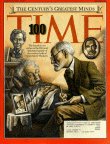
 |
LOCUS LINKS |
AetherLog: InPrint and OnLine
If the tag end of the century resembles the work of any single SF writer, it must surely be J.G. Ballard. ... While most SF writers of his generation were down at the Jet Propulsion Laboratory cheering on the moon landings, Ballard was in a London art gallery throwing a Pop Art happening with a crashed car and a topless model. Ballard's approach to the future was never rooted in engineering, physics or rocket science but rather in medicine, psychology and Surrealism. Time has been kind to him. ... A bizarre contemporary event like the paparazzi car-crash of Princess Diana is perfectly Ballardian.Also in the issue: profiles of ''cranks, villains and unsung heroes'' compiled, according to the editorial, at Sterling's suggestion; a speculation on future discoveries by John Maddox (What Remains to Be Discovered); and, in the regular part of the magazine, a review of the latest literary novel to take place at the end of 1999, Gail Godwin's Evensong (Ballantine).
• The New Yorker March 22nd For nearly two decades, Stanley Kubrick was intermittently obsessed with developing a science-fiction movie from a short story by Brian Aldiss called ''Super-Toys Last All Summer Long.'' It was about the adventures of a robot toddler who yearns to be a real boy and his interactive Teddy bear. Stanley gave the project the working title of ''A.I.'' -- for ''artificial intelligence'' ...Also in this issue: three poems by Jorge Luis Borges, and a one-page short story by Nadine Gordimer, ''Loot'', about an earthquake that uncovers a secret world.
• People Weekly March 15-22 By the late '80s he was taking in some $20 million a year and now cooks along at an estimated $40 million annually. ... The author is slowing down and feels he's close to the end of his novel writing. ''I don't want to be the 'grand ol' man','' he says. ''I don't want to be led up to accept any grand master awards on somebody's arm. I certainly don't want to descend into self-parody.'' Still, he expects his work to resonate even after he switches off the word processor. ''Scary books,'' he says, ''have this long life. They're like vampires themselves. They stick around.''
(posted Tue 23 Mar 1999)
• The Telegraph 13 March I was fed up by then. I'd written the equivalent of three novels, and developed various story lines, and it was all rejected out of hand. I do, however, remember Kubrick with great affection. I think of him roaming about through his endless rooms of machinery at night. Despite everything, despite his wife, despite the henchmen he had working for him there, I think it was a lonely existence.
• Slate 18 March
• New York Times 15 March
• Salon 15 March
Besides showing the prevalence of alternative sexuality, Bagemihl tells a fascinating story of the suppression of this vast body of information. "Zoology is a very conservative profession," and focusing on animal homosexuality is not the road to success. One researcher documented homosexuality in sheep, but didn't publish until she got tenure.
(posted Fri 19 Mar 1999)
Last week's Aetherlog |
|||||
| TOP |
| © 1999 by Locus Publications. All rights reserved. |
 • Time March 29th
• Time March 29th